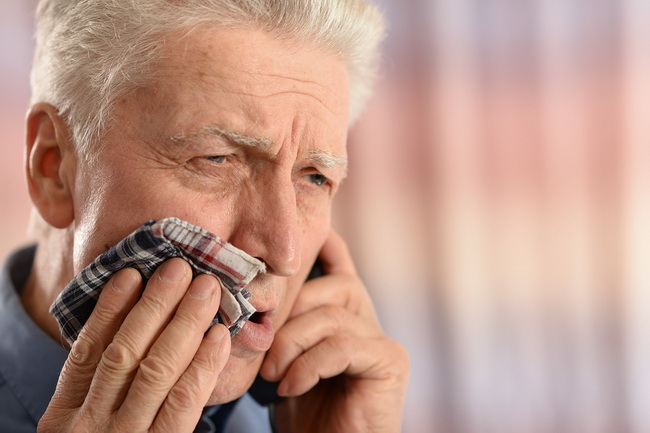- Make It Yourself Lavender Heart-Shaped Bath Bombs!
- 20 Things You Never Knew About “Down There”
- 12 Best Foods For Those Suffering From Arthritis Pain
- 12 Personal Hygiene Mistakes Almost Everyone Makes (Mom Never Told You About #4!)
- 15 Medicinal Plants And Herbs From The Cherokee People
- 12 Mind-Blowing Benefits Of Drinking Coconut Water During Pregnancy
- 12 Outstanding Winter Foods That Won’t Fatten You Up Like A Christmas Turkey
The Myth Of “Male Menopause”: Get The Facts On Aging And Testosterone

Photo credit: bigstock.com
You’ve probably noticed an increasing number of radio and television commercials talking about the dangers of “low T” and how it can be fixed. But what does this refer to?
“Low T” stands for “low testosterone,” or “male menopause,” as some people have begun calling it. It refers to the gradual decline in levels of the male sex hormone that occurs in men as they age, and the (mostly undesirable) side effects that occur along with it. But is there really such a thing as “male menopause,” and can it be stopped? There’s so much marketing B.S. out there these days that it’s hard to tell what’s really going on with testosterone.
Don’t worry. We’ve compiled the facts for you below.
Is “Male Menopause” real?
To make a long story short, no, it’s not. Testosterone levels are different in every individual, but as men get older, their levels of the hormone will gradually go down. Beginning around age 30, testosterone levels typically begin to decline by about 1 percent each year, according to the Hormone Health Network.
This is not, however, a form of “menopause.” That term correctly applies only to women, when their ovaries stop releasing eggs and estrogen production begins to rapidly decline, typically after the age of 40. Menopause occurs in all women; it’s simply a natural part of getting older. For men, on the other hand, hormonal changes are a lot more varied. Some men experience a rapid decline in testosterone, while others retain high levels for much longer. This is because testosterone can be affected by many lifestyle and health factors. Men also don’t become infertile with age. Sperm production will slow down, but it won’t stop.
Continue to Page 2

Photo credit: bigstock.com
What causes testosterone decline?
While testosterone decline will happen, the speed at which it occurs can depend on a lot of different things. As mentioned above, testosterone will decline naturally even in healthy men. But it can be influenced by certain chronic medical conditions like HIV/AIDS, kidney disease, depression, and being overweight. Other factors induce hormone and genetic disorders.
There are also certain medical treatments, like chemotherapy and radiation-based treatments, that can lower testosterone, as well as certain medications. Since testosterone is produced in the testicles, a testicular injury can also negatively affect levels of the hormone.
What are the symptoms of low testosterone?
Low-T is usually diagnosed through a series of blood tests. Having low levels of testosterone can manifest itself in a variety of different ways, including:
- Low levels of energy
- Low or diminished sex drive
- Erectile dysfunction
- Depression
- Irritability
- Insomnia
- Loss of body hair
- Increase in body fat
- Reduced muscle mass and bone density
- Gynecomastia (male breast development)
- Hot flashes (very rare)
Continue to Page 3

Photo credit: bigstock.com
What can be done about decreasing testosterone levels?
First things first, let’s talk about prevention. Simply living a healthy lifestyle can go a long way toward preventing the problems mentioned above from occurring in the first place. Get plenty of exercise (heavy compound movements with weights, like squats and deadlifts, are especially good for boosting testosterone production). Eat a healthy diet rich in proteins, good fats and carbs, as well as fruits, vegetables and nuts. Getting sufficient sleep is also very important. It’s been definitively proven that not getting enough sleep is a major contributor to lower testosterone levels.
Another factor is stress. Living a stressful lifestyle triggers the release of cortisol (the “stress hormone”), which, among other things, also lowers testosterone levels. Do what you can to reduce stress in your life, as this will have a significant impact on how rapidly testosterone levels go down as you age.
Now, there are also some methods you can use to reverse testosterone decline. Treatments like testosterone replacement therapy (TRT) are an option. This is usually done with injections, but there are also tablets and topical gels and patches that can reverse testosterone decline very effectively. Many people report positive results from these treatments, but it’s not right for everyone, so speak to a doctor first.
READ ALSO: The Surprising Truth About Common Health Myths Infographic
If you’re reading this and you’re a man, you now know there’s no such thing as an unavoidable “male menopause,” and you should be encouraged. Your lifestyle choices make a tremendous difference in whether you experience the symptoms listed above, or you continue to feel vibrant and healthy into old age. It’s up to you.
References:





























